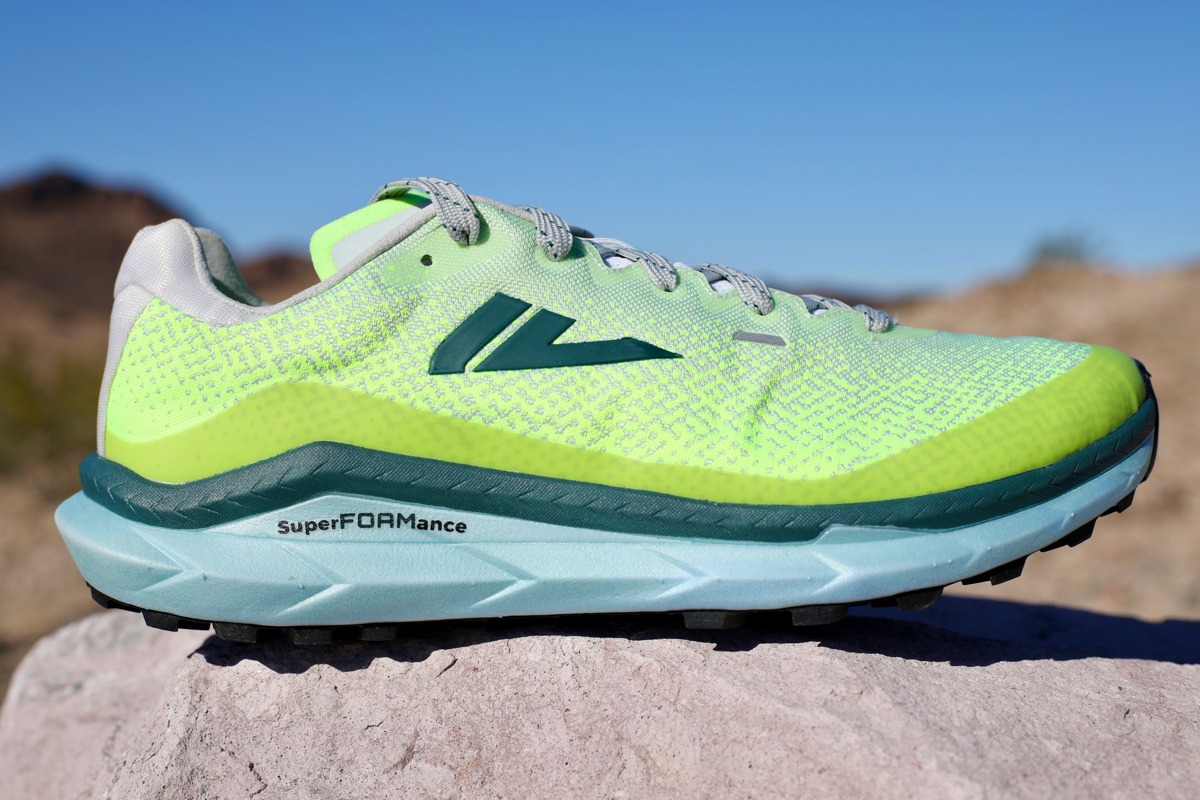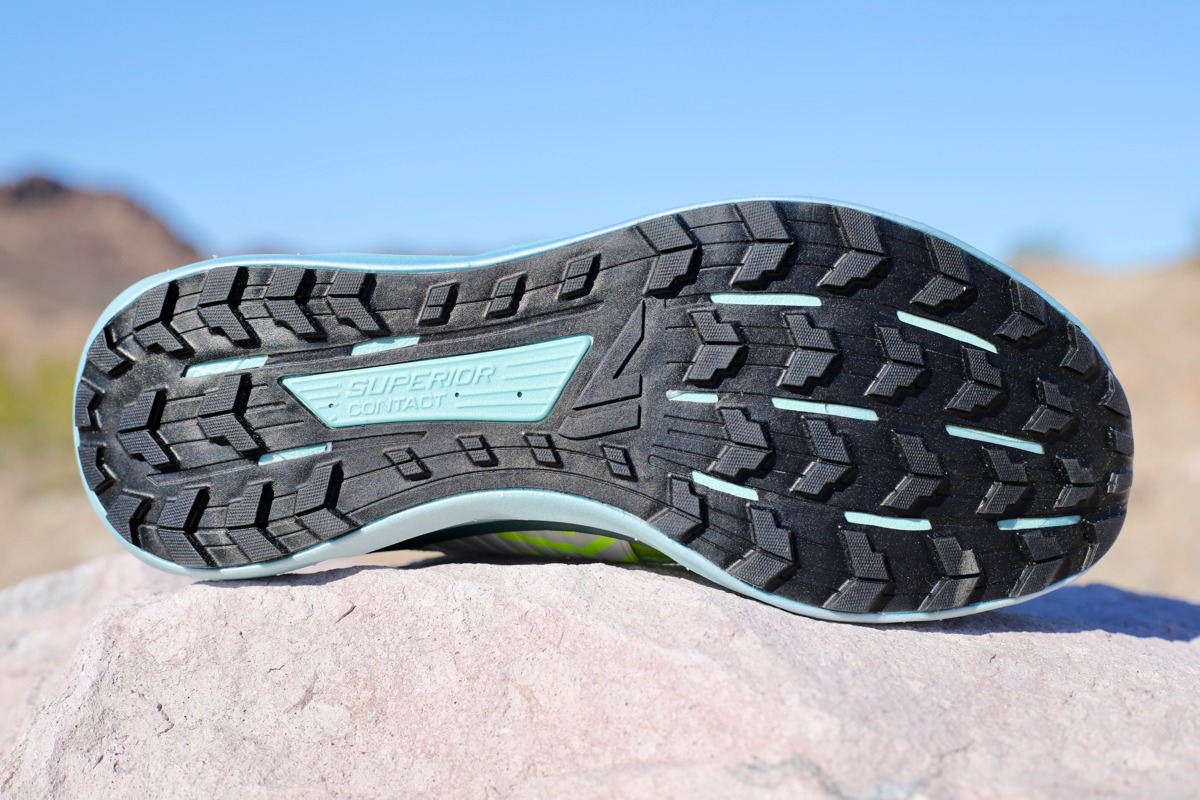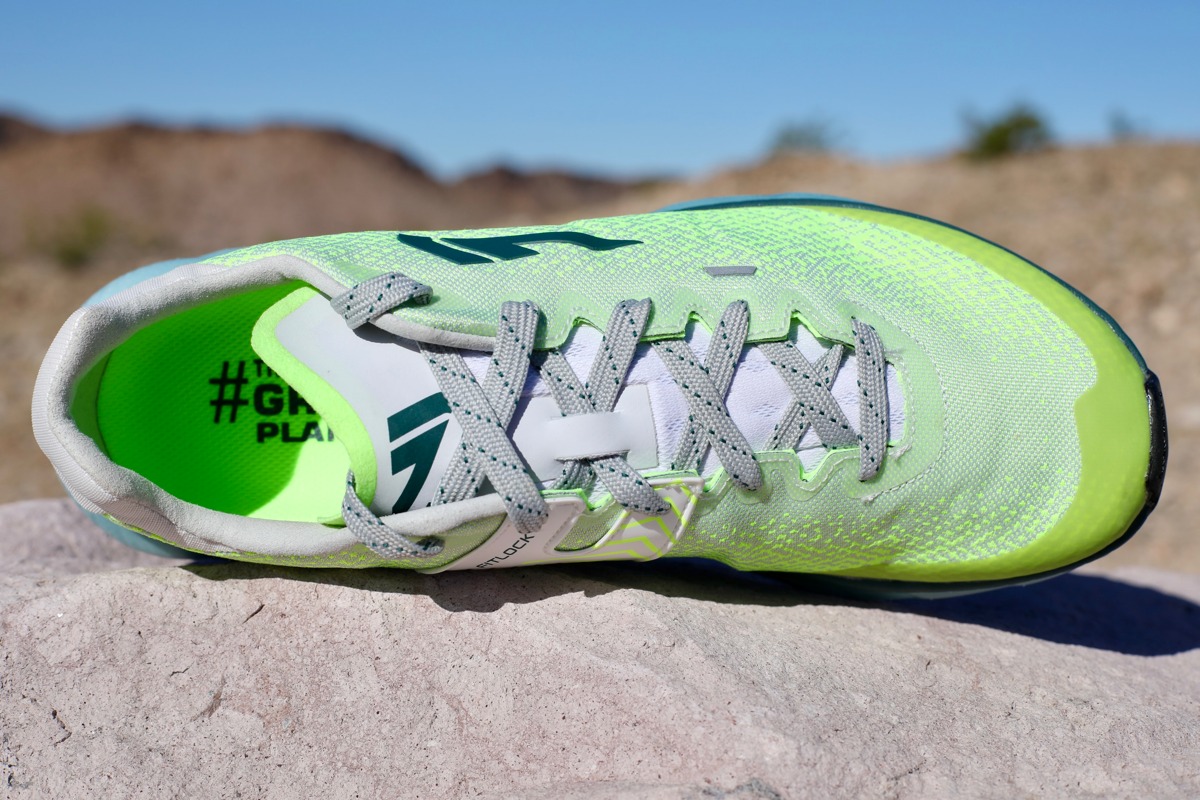VJ is a brand known for its aggressive and bold shoes, and the VJ MAXx 2 ($180) is a great entry point into the brand’s stable of offerings. My experience with VJ trail running shoes over the last couple of years has been a welcoming affair — these shoes turn on and tune up for trail conditions. I often refer to VJ shoes as niche trail and mountain performers and obstacle course racers par excellence, but I encourage any trail runner or adventurer residing across the geographies and geologies to lace up a pair.
It is an experience.
This shoe is a great option for those who haven’t had prior experience with the brand’s offerings. It has a more well-rounded design and more midsole cushion than other VJ models. The shoe casts a wide net on distance and terrain that it performs well on, including pavement, hard-packed forest roads, and slabs. I wasn’t hesitant about taking them out on two of my longest winter runs immediately after granting them freedom to fresh air, rain, and sunshine from their boxed compartment.
The VJ MAXx 2 is different than the prior version of the shoe, the VJ MAXx, in several definable ways, but the overall result is the same — a versatile shoe for all distances and surfaces. The VJ MAXx 2 has slightly more lift with a 31-millimeter heel and 25-millimeter toe stack height for a 6-millimeter drop to go with a 4-millimeter lug height. These specifications are generally amenable to a large swath of runners.
I consider the MAXx 2 to be a high-volume shoe. It is spacious and has the ability to lock down where it is needed the most. There is ample room in the toebox, but it comes more from additional vertical space rather than a traditional wide toebox akin to shoes from Topo and Altra. It pushes the scales at a claimed 9.9 ounces (282 grams) for U.S. men’s 9.5, but the Finnish designers have a way of engineering shoes to ride light. As a side note, apart from their winter-specific training shoes, most of VJ’s models are unisex fit, but that hasn’t stopped this woman from loving many of these models.
Shop the VJ MAXx 2VJ MAXx 2 Upper
Certainly, tremendous attention has been given to the superior outsole grip of the VJ MAXx 2, but the company’s attentiveness to the upper’s durability and functionality deserves equal recognition. VJ’s origin story dates to 1980s Finland and to the sport of orienteering, an activity that places high demands on footwear as shoes must be able to trek through a range of rough, rugged, and wet conditions over long expanses of time. This upper is a one-piece engineered mixed-Kevlar mesh material that superbly protects feet from rocks, snags, and barbs. There are only two stitch lines at the back of the heel for reinforcement.
Since orienteering often takes place in wet conditions or cyclic dry-to-wet scenarios, VJ integrates non-absorbent materials into the upper, which also contributes to the material’s overall robustness. There is a thin protective TPU bumper circling nearly the entire base of the upper for a little bit of extra protection. It isn’t as thick as seen on the brand’s more aggressive shoes, but it still provides a layer of defense against rocks and other low-lying threats.
As mentioned before, the MAXx 2 is a much wider and higher volume shoe overall compared to the more technical and rugged-oriented VJ options. This allows it to fit a variety of foot shapes, and it can still lock down the midfoot and heel.
VJ shoes integrate a Fitlock system at the midfoot, which is a thermoplastic wrap that extends from the midsole base up to the laces, snugging in the arch while subsequently keeping the heel firmly in place. The laces control the degree of movement and provide security, and they give a high level of control.
In digression, and if I may opine — aesthetically, the designers may be able to slightly tighten the upper around the forefoot — using less material and preventing creasing at the base of the toes and atop the toebox. This didn’t cause any discomfort or rubbing while running, but it may give the shoe a sleeker look and decrease its weight while still maintaining a higher volume for both wider feet and longer endurance outings.
VJ designers have listened to wearer feedback and invested in shoelace design, improving hold and material thickness. The laces are long enough for a double knot, or if desired, to slip through the upper lace hole. Once those laces are tied, the tongue is firmly in place. I applaud VJ for creating a tongue that has a soft felt underside and smooth feel. There is a more open mesh atop the tongue.
The MAXx 2 upper is the color of a tennis ball — green or yellow on the neon spectrum — and sometimes you feel like one bouncing along the trails. There is good reason for that.
VJ MAXx 2 Midsole
One of the main differences between the original VJ MAXx and the VJ MAXx 2 is the midsole foam. To stay at the leading edge of midsole science and technology, the MAXx2 comes to market with a proprietary and more fully cushioned SuperFOAMance midsole.
This is an improvement compared to the Poron cushion integrated into the heel and forefoot midsole of the original MAXx. This shift places VJ in competition with other high-performing trail runners in navigating the nuances and science of midsole foam and energy return. The SuperFOAMance foam offers ample rebound for continued endurance and strong kicks across the spectrum of running gears without overwhelming the runner with too much cushion and a lack of ground feel.
The shift in foam offers a lightness and welcoming cushion to a more technically geared shoe. Interestingly, there is still a full-length rock plate to protect the runner from the ruggedness underfoot. I tried to really engage with this underfoot feel across a variety of trail textures and found that I generally like this combination. It had me reflecting upon my appreciation for the Topo Terraventure 4 — both are shoes that give a little while still providing enough protection.
It is a delicate balance between torsional rigidness and comfort that provides the ability to push the shoe onto and into unforgiving environments. The updated midsole foam opens the gates to not only longer endurance adventures — 50 to 100 kilometers — but also allows a runner to tread more easily on pavement and hardened forest access roads. It’s worth noting that the midsole extends out beyond the upper. Some trail runners refer to these protrusions as rudders, and they offer increased stability, control for downhill running, and comfort for heel landings.
VJ MAXx 2 Outsole
The VJ MAXx 2 comes from a long line of shoes with outsoles designed to perform on the technical terrain faced by an orienteering athlete. The company has undoubtedly succeeded in living up to the motto of providing “the best grip on the planet.” The outsole on the MAXx 2 maintains the butyl rubber grab the brand is known for, although with less intensity than that found in VJ’s niche shoes. Instead, the outsole has more typical four-millimeter chevron-shaped lugs for longer ground contact times, a less aggressive bite, and less overall stiffness.
The outsole performs as advertised, but with the new midsole foam and smaller lug heights, the shoe is still comfortable on harder surfaces. This is advantageous when runs include both pavement or dirt roads and technical trails.
Overall, the outsole is a standout, but the MAXx 2 isn’t best in slick, muddy conditions where some of its fellow VJ models stand out, including the VJ XTRM 2.
VJ MAXx 2 Overall Impressions
I am a tremendous fan of VJ shoes, and the VJ MAXx 2 is a great introduction to the brand for those who haven’t experienced it before. I often have a repetitive nature or a main theme when I write shoe reviews. There are certain elements of the testing experience and the shoe that I hope readers take away while engaging in self-education or leaning on the splendid mix of subjective-objective gear verbiage when deciding whether a running shoe is right for them.
And I’d like to reiterate that I am a tremendous fan of the VJ brand.
Their shoes are designed for rugged performance, the unpredictability of the elements, and varied terrain that many “normal” trail running shoes can’t handle regularly. When I slip into a VJ, I feel doubly protected and confident that the shoe will perform as expected.
The MAXx 2 is an entry point into the universe of VJ footwear and is a dependable shoe that stands on the podium of versatility and ultra endurance anytime, anywhere. It can handle myriad environments with substantially more cushioning and less edge than its shake-’em-down gritty siblings. Whereas I commented on previous VJ reviews, “the overall firmness and hard rubber seem to limit it to ultra experiences versus ultra distances,” the MAXx 2 alternatively offers trail runners and adventurers the best of both ultra experiences and ultra distances.
Shop the VJ MAXx 2Call for Comments
- Have you tried a pair of VJ shoes? What did you think?
- Do you have another pair of shoes for adventurous missions?
Our Favorite Trail Running Shoes
Check out our Best Trail Running Shoes article to learn about our current favorite trail running shoes!





